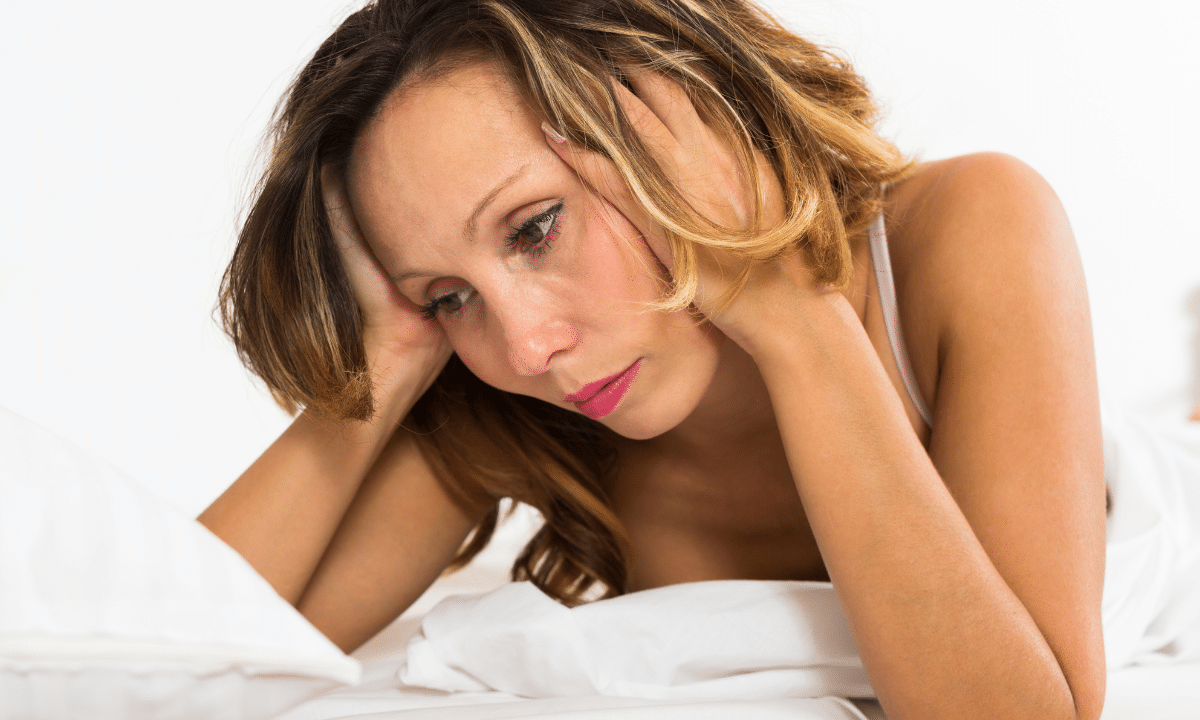
Introduction:
Hormone Replacement Therapy (HRT) is a treatment option that many women consider during the menopause transition to manage their symptoms such as hot flashes, night sweats, and vaginal dryness. However, there is growing concern that HRT might increase the risk of anxiety and other mental health issues in menopausal women. In this article, we will discuss the relationship between HRT and anxiety and address some common questions related to this topic.
HRT and Anxiety:
HRT is a treatment option that can help alleviate the physical and emotional symptoms of menopause, but it is not without risks. Many studies have suggested that HRT use can lead to an increased risk of anxiety and other mental health issues in some women.

The exact mechanism behind this association is still unclear, but it is thought to be related to the role of hormones in regulating mood and emotions. Hormones such as estrogen and progesterone can have a significant impact on the brain’s chemistry, and changes in hormone levels during menopause can disrupt this balance, leading to mood swings, anxiety, and depression.
It is important to note that not all women who use HRT will experience anxiety, and the risk of developing anxiety may vary depending on several factors, including age, duration of HRT use, and the type of HRT being used. Therefore, it is crucial to discuss the risks and benefits of HRT with a healthcare provider to determine whether it is a suitable treatment option for individual menopausal women.
HRT cured my anxiety.

It is possible that HRT can help alleviate anxiety symptoms in some women, but it is not a guaranteed treatment. The impact of HRT on anxiety can vary depending on several factors, including the type of HRT being used, duration of use, and individual health factors.
Estradiol and anxiety HRT.

Estradiol is a form of estrogen and is a component of some HRT treatments. Some studies suggest that estradiol may help alleviate anxiety symptoms in some women, but more research is needed to fully understand the relationship between estradiol and anxiety.
HRT for anxiety reviews.
There are mixed reviews on the effectiveness of HRT for anxiety. Some women report that HRT has helped alleviate their anxiety symptoms, while others report no improvement or even an exacerbation of anxiety symptoms.
Best HRT for anxiety.
There is no single HRT treatment that is considered the best for anxiety. The most effective treatment for each woman will depend on individual health factors and symptoms. It is important to discuss the risks and benefits of different HRT treatments with a healthcare provider to determine the most suitable option.
Can HRT help with depression and anxiety?
HRT can help alleviate symptoms of depression and anxiety in some women, but it is not a guaranteed treatment. The effectiveness of HRT for depression and anxiety can vary depending on individual health factors and the type of HRT being used.
HRT anxiety Reddit.
There are several discussions on Reddit related to HRT and anxiety. Some women report positive experiences with HRT in managing anxiety symptoms, while others report no improvement or even an exacerbation of anxiety symptoms.
HRT with estrogen.
Estrogen is a component of many HRT treatments, and some studies suggest that estrogen may help alleviate anxiety symptoms in some women. However, the impact of estrogen on anxiety can vary depending on individual health factors.
Hormonal anxiety symptoms.
Hormonal changes, such as those that occur during menopause, can lead to hormonal anxiety symptoms. These symptoms may include mood swings, irritability, and feelings of anxiousness.
Does hormone replacement therapy help anxiety?
HRT may help alleviate anxiety symptoms in some women, but it is not a guaranteed treatment. The impact of HRT on anxiety can vary depending on several factors, including the type of HRT being used and individual health factors.
Can taking HRT cause anxiety?
Some studies suggest that HRT use can increase the risk of anxiety in some women. However, not all women who use HRT will experience anxiety, and the impact of HRT on anxiety can vary depending on several factors.
How long does HRT take to stop anxiety?
The length of time it takes for HRT to alleviate anxiety symptoms can vary depending on individual health factors and the type of HRT being used. It is important to discuss the timeline for HRT effectiveness with a healthcare provider.
How can I stop hormonal anxiety?
There are several strategies that women can use to manage hormonal anxiety, including exercise, meditation, yoga, and cognitive-behavioral therapy. Additionally, some women may benefit from non-hormonal treatments for menopause symptoms, such as selective serotonin reuptake inhibitors (SSRIs) and gabapentin. Women should discuss the most suitable treatment options with their healthcare provider.
FAQs:
- Can HRT cause anxiety?
While HRT is an effective treatment for menopause symptoms, it is not without risks, and some studies suggest that HRT use can increase the risk of anxiety in some women. However, not all women who use HRT will experience anxiety, and the risk may vary depending on several factors, including age, duration of HRT use, and the type of HRT being used.
- How can I manage anxiety during menopause?
There are several strategies that women can use to manage anxiety during menopause, including exercise, meditation, yoga, and cognitive-behavioral therapy. Additionally, some women may benefit from non-hormonal treatments for menopause symptoms, such as selective serotonin reuptake inhibitors (SSRIs) and gabapentin.
- Are there any alternatives to HRT for managing menopause symptoms?
Yes, there are several non-hormonal treatment options available for managing menopause symptoms, including lifestyle changes, such as exercise and diet modifications, and non-hormonal medications, such as SSRIs, gabapentin, and clonidine. Women who prefer to avoid HRT may also consider alternative therapies, such as acupuncture and herbal remedies.
- Is it safe to use HRT for an extended period?
The duration of HRT use depends on the individual’s risk factors and health status. While some women may use HRT for an extended period, others may need to discontinue HRT after a certain duration due to increased health risks. Women should discuss the risks and benefits of HRT with their healthcare provider to determine the best treatment plan for their individual needs.
Conclusion:
Hormone Replacement Therapy is a popular treatment option for women going through menopause. However, it is not without risks, and some studies suggest that HRT use can increase the risk of anxiety and other mental health issues in some women. Therefore, it is crucial to discuss the risks and benefits of HRT with a healthcare provider to determine whether it is a suitable treatment option for individual menopausal women.
It is also important to note that there are several non-hormonal treatment options available for managing menopause symptoms, and women who prefer to avoid HRT may consider these alternatives. Furthermore, women can also use strategies such as exercise,



